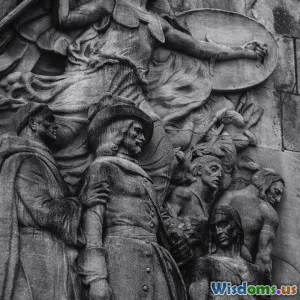
Legacies That Shaped Our World
6 min read Explore the remarkable legacies of great figures who shaped our world, influencing society, culture, and history across centuries. (0 Reviews)
Legacies That Shaped Our World
Throughout history, certain individuals have left indelible marks on society, culture, and politics. Their legacies continue to influence our world today, shaping our values, beliefs, and institutions. This article delves into the lives and contributions of these remarkable figures, examining how their actions and ideologies have molded the course of history.
The Importance of Legacy
A legacy is not merely a reflection of what someone has accomplished; it encompasses the lasting impact their work has on future generations. From monumental changes in governance to cultural revolutions, legacies serve as a bridge between the past and the present, reminding us of the potential for change and the necessity of progress.
Great Figures and Their Legacies
1. Mahatma Gandhi (1869-1948)
Gandhi is perhaps one of the most recognized figures in the fight for civil rights and freedom. His philosophy of non-violent resistance inspired movements for civil rights and freedom across the world. The legacy of his teachings on peace and non-violence continues to resonate today, influencing leaders like Martin Luther King Jr. and Nelson Mandela.
2. Marie Curie (1867-1934)
As a pioneering scientist, Marie Curie's work in radioactivity not only advanced the field of physics but also opened doors for women in science. Her discoveries laid the groundwork for advancements in medical treatments and nuclear energy. Curie’s legacy encourages future generations of women to pursue careers in STEM fields, breaking barriers and challenging stereotypes.
3. Nelson Mandela (1918-2013)
Mandela’s fight against apartheid in South Africa is a testament to the power of resilience and forgiveness. After spending 27 years in prison, he emerged not with a desire for revenge but with a commitment to reconciliation. His legacy of unity and social justice continues to inspire activists worldwide, reminding us of the importance of empathy and understanding in the face of adversity.
4. Leonardo da Vinci (1452-1519)
Known as the quintessential Renaissance man, da Vinci was not only a master painter but also an inventor, scientist, and thinker. His innovative ideas and artistic masterpieces, such as the Mona Lisa and The Last Supper, have left a lasting impact on art and science. Da Vinci’s legacy embodies the spirit of inquiry and creativity, encouraging future generations to explore the intersection of art and science.
5. Rosa Parks (1913-2005)
Rosa Parks’ refusal to give up her bus seat catalyzed the American civil rights movement. Her act of defiance became a symbol of resistance against racial segregation. Parks’ legacy lives on as a reminder of the importance of standing up against injustice, inspiring countless individuals to advocate for equality and civil rights.
The Ripple Effect of Legacies
The legacies of these figures extend beyond their immediate contributions; they foster a ripple effect that influences countless lives. For instance, Gandhi’s principles of non-violence not only impacted political leaders but also inspired cultural movements, such as the anti-war protests of the 1960s. Similarly, the scientific breakthroughs by Marie Curie have paved the way for ongoing research in cancer treatment, affecting millions of lives globally.
Preserving and Learning from Legacies
Understanding the legacies of these great figures is crucial for fostering a more inclusive and equitable society. Educational institutions, museums, and cultural organizations play a vital role in preserving these legacies, ensuring that future generations can learn from them. By studying their lives and contributions, we can glean insights into the values and principles that drive meaningful change.
Conclusion
The legacies of great figures like Gandhi, Curie, Mandela, da Vinci, and Parks remind us that individual actions can lead to profound societal changes. As we reflect on their lives and contributions, we are inspired to carry forward their messages of peace, equality, creativity, and resilience. By embracing their legacies, we continue to shape our world for the better, ensuring that their impact endures for generations to come.
Rate the Post
User Reviews
Popular Posts





















